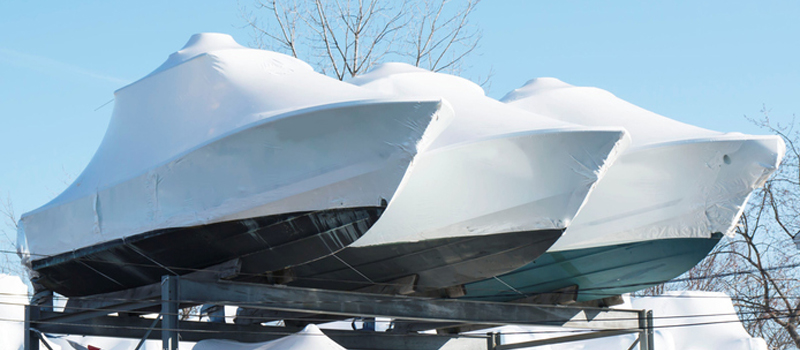Winterizing Watercraft
Winterizing Watercraft

Winterizing Watercraft
Every boating season hopefully ends with one last good outing on the water, followed by the process of readying your watercraft for the winter. The components of this process depend on your watercraft's size, engine type, features, and location.
Why Winterize Boats and Jet Skis?
Most watercraft larger than a kayak or paddleboard require winterization. Your boat or jet ski will be sitting unused for months, and failing to prepare your watercraft for those cold months could result in problems in the spring.
Improperly winterizing your boat or jet ski could leave you with:
- Bad fuel that must be dumped and cleaned out
- A dead marine battery that must be replaced
- Frozen fluids that split lines or break seals
- Mold and mildew growth
- Vermin and their nests
How To Winterize Watercraft
Winterizing your watercraft can be as simple as shrink-wrapping it on the trailer, or as complicated as working with a mechanic to drain fluids and check multiple systems.
Depending on your boat or jet ski, the winterizing process may require:
- Engine: Outboards used in freshwater might require nothing more than fuel stabilizer, which keeps gasoline from going bad. Many engines should be checked by a mechanic, who can inspect the engine, drain the fuel, oil, and other fluids, as well as flush the engine (this is especially important if the watercraft is operated in salt water).
- Electronics: Power boats should have their batteries removed, and then recharged the following spring. Depth finders, radar systems, radios, and other electronics don't necessarily require much winterization as long as they're well protected.
- Gear: Any non-permanent gear that's valuable should be removed and stored in a safe place. Even well-kept marinas aren't necessarily the most secure facilities. You may want to remove high-end fishing gear, water skis, electronics, or other items. It's usually alright to leave fenders, lines, and safety equipment onboard, as theft is unlikely.
- Vermin Prevention: Consider using a rodent deterrent to keep mice and other vermin from building nests. Pests can live in engines, chew upholstery, urinate anywhere, and cause electrical damage. Mothballs are usually effective. Peppermint extract is a natural alternative.
- Storing: Virtually all boats should be shrink-wrapped for outdoor storage or kept in a building for the winter (preferred). This provides protection against the elements, leaves, and other debris, which could cause mold or mildew to grow. It also helps protect your upholstery, carpeting, and wood from sun-related fading.
Check Your Watercraft Insurance
Assuming your watercraft is something larger than a kayak or dinghy, it's generally recommended that you purchase watercraft insurance. If you don't yet have insurance, now is a good time to check what policies are available.
If your boat or jet ski is insured, you should still talk with an agent about your coverage. It may make sense to adjust coverage for the winter, and then to readjust again in spring.
To review your watercraft insurance coverage, check to find a watercraft insurance agent close to you.
